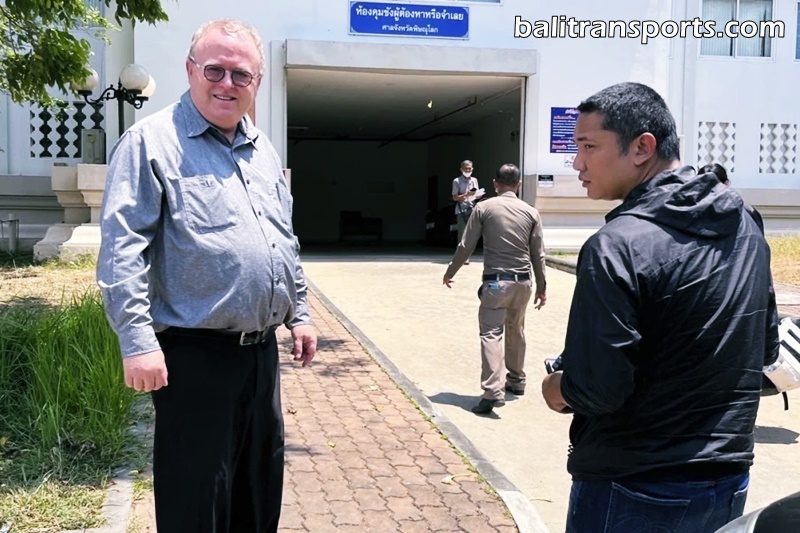Monday | May 26, 2025
Thailand Declines to Prosecute American Academic on Royal Defamation Charges, But Legal Uncertainty Remains
On Thursday, Thai state prosecutors announced that they will not move forward with charges against American academic Paul Chambers, who was arrested last month on allegations of royal defamation—a crime under Thailand’s strict lèse majesté law, which carries a prison sentence of up to 15 years.
Chambers, a 58-year-old native of Oklahoma and a political science lecturer at Naresuan University in Phitsanulok, northern Thailand, had been taken into custody in early April. His arrest triggered widespread concern among scholars in the field of Asian studies and drew the attention of the U.S. government. Chambers is widely recognized for his academic work focusing on Thai military influence and political dynamics, subjects that touch on sensitive aspects of the country’s power structure.
Although the Office of the Phitsanulok Provincial Prosecutor has opted not to proceed with formal prosecution at this time, the case is not yet fully resolved. The decision not to indict Chambers will be submitted to the Provincial Court, which must formally approve the dismissal of charges. Additionally, the case file and the non-prosecution order will be forwarded to the Commissioner of Provincial Police Region 6, who retains the authority to review and potentially contest the decision. In other words, Chambers could still face legal action if the police disagree with the prosecutor’s decision.
Chambers’ arrest stemmed from a complaint filed by the northern regional office of Thailand’s powerful Internal Security Operations Command (ISOC), a military agency tasked with maintaining national security. The complaint was based on a Facebook post that included translated content from a website operated by the ISEAS–Yusof Ishak Institute, a Singapore-based think tank. The post referred to a webinar discussing Thai politics, in which Chambers was one of the featured participants. According to his supporters, however, the material cited in the charge sheet—specifically the text used to promote the webinar—was not authored by Chambers himself.
Following his arrest, Chambers was detained for two nights before being released on bail. As part of his bail conditions, he was required to wear an ankle monitor, a restriction that the court lifted earlier this week. Despite his release, his legal and immigration status remain uncertain. His visa was revoked shortly after his arrest, under provisions of Thai immigration law that prohibit entry to individuals suspected of engaging in activities deemed detrimental to public order or morality. These provisions are typically reserved for offenses such as drug trafficking, human trafficking, and prostitution. It remains unclear whether Chambers’ visa will be reinstated.
In response to the developments, the U.S. State Department reiterated its longstanding concerns about the application of lèse majesté laws in Thailand. “This case reinforces our longstanding concerns about the use of lèse majesté laws in Thailand,” a spokesperson said following Chambers’ arrest. “We continue to urge Thai authorities to respect freedom of expression and to ensure that laws are not used to stifle permitted expression.”
Thailand’s lèse majesté law, codified under Section 112 of the country’s criminal code, prescribes a penalty of three to fifteen years in prison for anyone who “defames, insults or threatens” members of the royal family, including the king, queen, heir apparent, or regent. It is widely considered one of the harshest royal defamation laws in the world and has been frequently criticized by human rights groups for its use in silencing political dissent.
While the Thai monarchy has traditionally been regarded as a sacred and unassailable institution, particularly by conservative factions within the military and judiciary, public discourse around the role of the monarchy has shifted in recent years. Since 2020, a youth-led pro-democracy movement has sparked unprecedented public debates on monarchy reform, challenging long-standing taboos. These protests, which called for political reforms and greater accountability from the royal institution, have resulted in a surge of lèse majesté prosecutions. According to Thai Lawyers for Human Rights, a legal aid organization, more than 270 individuals—many of them student activists—have been charged under the law since early 2020.
Chambers’ case underscores the risks faced by academics and commentators addressing politically sensitive topics in Thailand. Though he may avoid prosecution for now, the lingering possibility of renewed legal action, combined with the revocation of his visa, raises broader concerns about academic freedom, due process, and the selective enforcement of laws related to national security and royal defamation.

